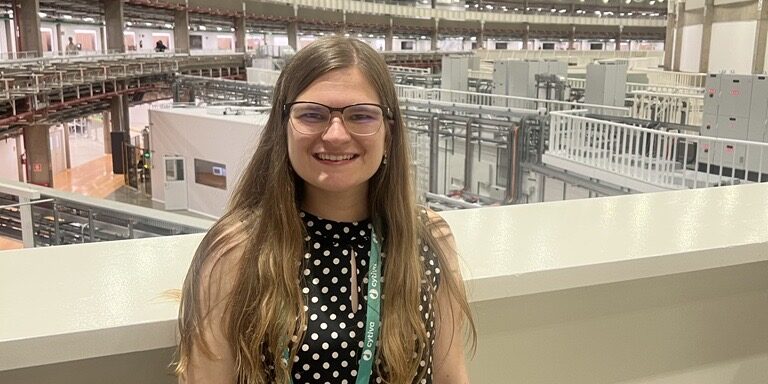Gabriela Noske, currently a researcher at LNNano, completed her doctoral research at USP São Carlos and used CNPEM’s open facilities
The scientist Gabriela Noske, currently a researcher at the Brazilian Center for Research in Energy and Materials (CNPEM) in the Brazilian Nanotechnology National Laboratory (LNNano), was awarded the CAPES Dissertation Prize in the area of Physics.
The prize highlights the best doctoral dissertations defended in Brazilian graduate programs, and considers criteria such as originality, impact on scientific, technological, social, and innovation-related development, as well as contributions from the educational system. Established in 2005 and first awarded in 2006, the prize covers all knowledge areas covered in graduate degree programs to boost the visibility of CAPES incentives and activities in advanced education in Brazil.
Gabriela’s study entitled “Structural characterization and search for protease inhibitors for the emerging yellow fever and SARS-CoV-2 viruses” was carried out at the Institute of Physics in São Carlos (IFSC) within the University of São Paulo (USP), advised by Glaucius Oliva and with André Schutzer de Godoy as a co-adviser.
This is not the first award Gabriela has won; in March 2024, she was one of the winners of the Herbert Tabor Early Career Investigator Awards for an article published the previous year. In this work, which was part of her doctorate, Gabriela used the Manacá beamline at Sirius to characterize different protease (Mpro) polymorphisms of the virus that causes Covid-19 and their relationship with the effectiveness of antivirals developed during the pandemic.
Besides her research related to the search for protease inhibitors for the SARS-CoV-2 virus, she also worked with the virus that causes yellow fever. This virus in the genus Flavivirus causes a severe infectious disease that is mainly transmitted by mosquitoes in tropical regions. Yellow fever is characterized by symptoms ranging from fever and chills to more severe forms that include hemorrhage and organ failure. Although an effective vaccine has existed for decades, outbreaks still occur, especially in regions with low vaccine coverage.
In her study Gabriela used integrative structural biology, combining biochemical and biophysical techniques with structural analysis using x-ray crystallography and cryomicroscopy. This research specifically used cryogenic electron microscopy, an area in which she currently works, to determine the structure of the main protease for SARS-CoV-2, a challenging sample and one of the smallest structures obtained so far using this method. These findings provide a better understanding of how this protease matures, and cryomicroscopy was essential to the process, offering significant information about the structure of the protein closer to its native form and supplementing the findings of the crystallographic analysis.
This work to reveal the structural characteristics of yellow fever proteases is very important, since these enzymes are essential to the virus life cycle and play an important role in protein cleavage and assembly of new viral particles. Identifying and describing these proteases may lead to the development of new antiviral treatments that could be important additions to the strategies to control this disease, especially in situations where vaccination is insufficient or unavailable. This research consequently helps broaden scientific knowledge on emerging viruses and prepare more effective responses to future threats to public health.
About CNPEM
The Brazilian Center for Research in Energy and Materials (CNPEM) is home to a state-of-the-art, multi-user and multidisciplinary scientific environment with activities on different fronts within the Brazilian National System for Science, Technology and Innovation. A social organization overseen by the Ministry of Science, Technology and Innovation (MCTI), CNPEM is driven by research that impacts the areas of health, energy, renewable materials, and sustainability. It is responsible for Sirius, the largest assembly of scientific equipment constructed in the country, and is currently constructing Project Orion, a laboratory complex for advanced pathogen research. Highly specialized science and engineering teams, sophisticated infrastructure open to the scientific community, strategic lines of investigation, innovative projects involving the productive sector, and training for researchers and students are the pillars of this institution that is unique in Brazil and able to serve as a bridge between knowledge and innovation. CNPEM is responsible for operating the Brazilian Synchrotron Light (LNLS), Biosciences (LNBio), Nanotechnology (LNNano), and Biorenewables (LNBR) National Laboratories, as well as the Ilum School of Science, which offers a bachelor’s degree program in science and technology with support from the Ministry of Education (MEC).


